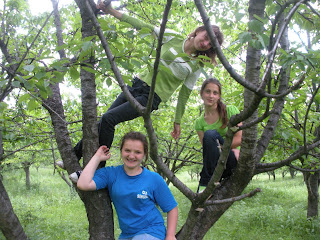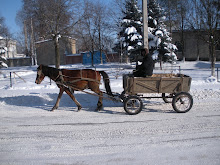Here you can see the results of one of our first activities--Problem trees. We first wrote the problems we identified on the trunks, followed by the effects of the problem on the leaves. This part was easy, but identifying the "root" causes of problems creates a lot more debate, and requires a lot more time. From this activity we discovered the deforestation in the village is possibly caused by people taking the lumber for keeping their homes warm in winter. The chemistry classes do not actually prepare and observe experiments because equipment is old or missing and a budget for acquiring chemicals was never established. They have no chemicals to create reactions and no beakers because after they were all broken, nobody had money to replace them. It's my understanding that no one in this village, since the fall of the Soviet Union, has learned about chemical reactions from more than just a textbook. Finally, the gymnasium is just something the youth would like to see improved and modernized.
From this activity, we identified possible solutions to the problems and analyzed their validity based on internal strengths and weaknesses, and the external opportunities and threats that may be presented. This method is called SWOT. Some of the solutions the youth came up with were deemed insufficient after doing the SWOT, others deemed reasonable if the external threats could be attended to first.
Clearly, this is why I am here in Moldova. This is what I wish I could do everyday. Build the capacity of others and organizations to solve their own problems without simply stopping at "we are poor." These youth want change, and from what I observed, are far more optimistic about their future than their parents. Sadly, I found the adults in this village among the more despondent. Yet, the ring leader of the group, Mihaela (blue shirt), has a theme for their work: If we want it, we can get it.






























No comments:
Post a Comment